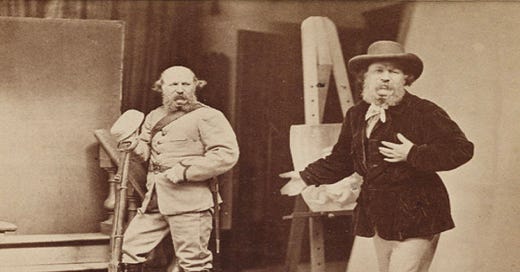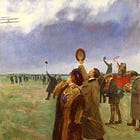From time to time, The Tactical Notebook will republish an “oldie but goodie” from our back catalogue. This is one such piece.
The profession of arms is a young man's game. Thus, at a stage of life where many people are still in the journeyman stage of their vocations, most military folk have begun to contemplate their second careers, almost all of which will require them to put one foot (at least) in the civilian world.
The effect of such anticipation upon the education of military professionals is not a happy one. The point at which "second-career contemplation" moves from the domain of pipe dreams to that of concrete plans occurs when leaders find themselves moving out of the well-structured world of the battalion-sized unit and into the chaotic realm of formations and frenemies. Thus, at the very time when an officer or senior non-commissioned officer should be making the transition from "craftsman" to "artist," he finds himself distracted by the need to acquire expertise of a very different sort.
One solution would structure benefits in a way that gives each recent retiree a paid sabbatical, a period of time that would allow him to make the transition from military service to civilian work in a relatively leisurely way. (The armies of the German Empire did this for career non-commissioned officers preparing for second-careers in various forms of civil service.) Such a program would make it easier for older military professionals to postpone their professional metamorphoses until after they actually retire, thereby permitting them to focus on their military studies until the very moment they hang up their uniforms.
Another response would promote the study of the arts of war in ways that also foster the development of skills that are also valued in the civilian world. These include such things as critical thinking, communications skills, adaptability, empathy, capacity for innovation, general knowledge about the world, and an understanding of the practical implications of culture. In other words, we can help military people prepare for life on the other side of retirement by teaching military subjects by means of decision-forcing cases.
Marvelous to say, while fostering a large number of virtues that are valued in the civilian workplace, the case method helps also students cultivate virtues of a more martial sort. These include a bias for action, tolerance for ambiguity, and the ability to adapt to changing circumstances in a very short period of time. In short, teaching military subjects by means of decision-forcing cases allows the civilians of the future to "have their cake and eat it, too."
For Further Reading:
To Share, Subscribe, or Support:










The senior NCO or Officer about to retire and transition to civilian employment faces many more hurdles than they might think. While they believe their work habits, values and experience are desired , they are not. The exception is in highly technical stove pipes. For all others they face the following:
1. Stereo types that brand them as aggressive, lacking nuance, automatons, lock step, intolerant and dictatorial.
2. Limited ability to grasp the profit motive, ROE, ROI, marketing and salesmanship.
3. Middle managers who view the post career military individual as a competitor.
4. Civilian employers who dismiss the leadership skills as they believe all they did was give orders.
5. HR is not your friend. Many of the personality types drawn to HR will be hostile due to their prejudices and outlook.
Most military retirees transition into positions of far less responsibility, scope, limited number of subordinates and autonomy than they exercised in the military. The 45 year old professional is a new employee and treated much like the 24 year old. Their “supervisor” is often significantly younger.
The Combat Arms senior NCOs and Officers are mission and team focused and often crash in the Machiavellian world of civilian office politics and subterfuge.
I would estimate that fully successful career transitions are relatively rare. One of the biggest wastes in modern America is the under utilization of retired military individuals who decide to enter the private sector.
Most transition when they should be reaching peak earning potential while they have significant expenses like children’s college tuition, aging parents, repeated moves….. It is a risky time to start a business which is the best long range strategy.
Excellent. Never gave this much thought before but it gives an extra layer to explain the dysfunction of defence research and procurement.